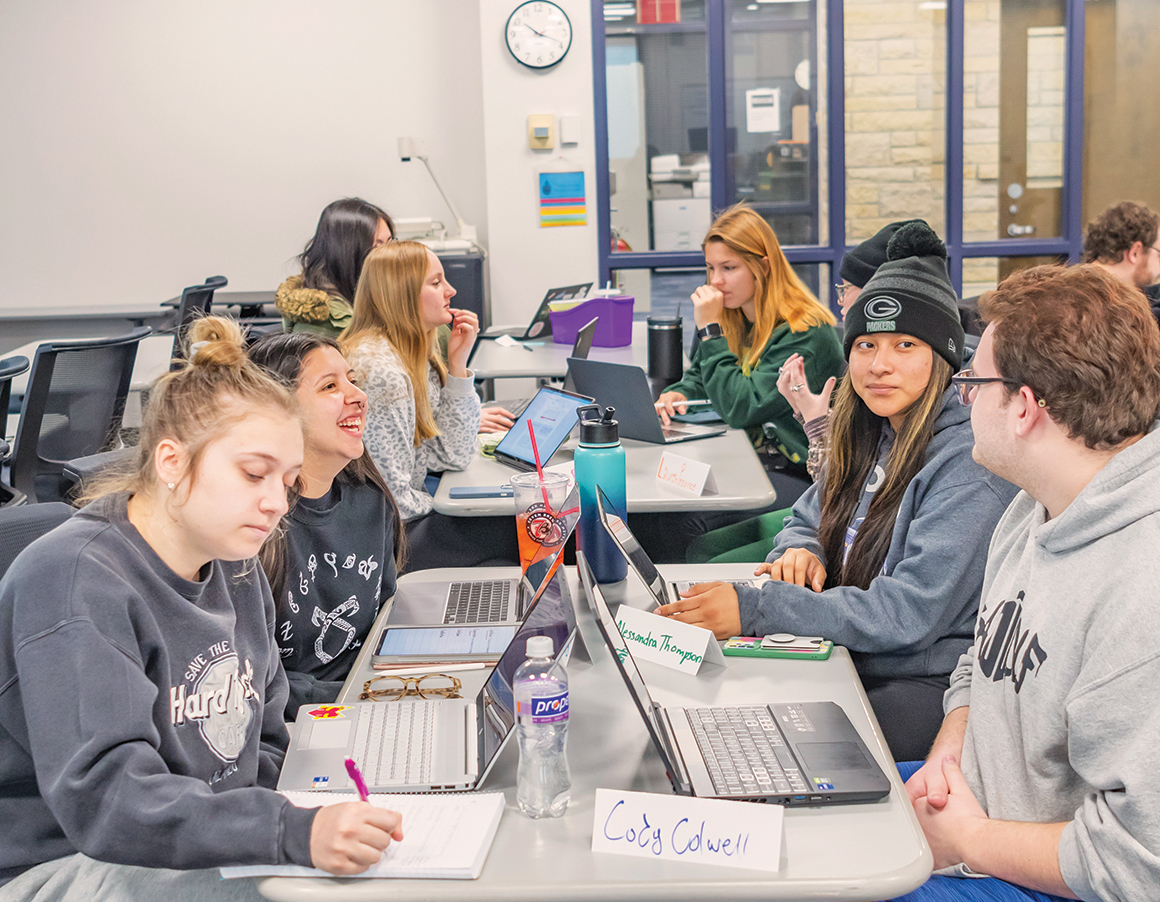Lecturers Gary Graves, b ed ’16 (back, left), and Craig Carter (back, right) taught a class together this spring in the education department’s new home in the former School of Law building. Photo by Jeremy Wangler
From The Ichabod – Spring 2024
Story by Angela Jonas
In recent years, the Washburn education department has made a fresh start.
The most obvious change: the department has moved from Carnegie Hall to the new building for the University Library and Student Success Center, which used to house the Washburn University School of Law. The move happened after the School of Law relocated to its new building last year.
For Gloria Dye, who has been a professor in the education department since 1994 and plans to retire this summer, the biggest benefit to the new space is the accessibility it offers.
“Carnegie is the oldest building on campus, and it is beautiful and historic, but it wasn’t accessible for individuals with disabilities,” Dye said.
The resulting move gave the department bigger and more accessible spaces and put them in closer contact with colleagues from around the University, including the Center for Student Success and Retention, Washburn Libraries, Honors Program and the Aleshire Center for Leadership and Community Engagement. Cherry Steffen, chair and professor, education, is eager to see what types of collaboration will occur due to their proximity to these departments.
“I’m excited about what Washburn is doing with the rest of the old law school space,” Steffen said. “There are opportunities for us to work closely with parts of campus we haven’t before, such as first-generation students or nontraditional students. I am hopeful it gives us the chance to become more involved in those areas.”
Complementing the move from Carnegie, the education department also shifted its academic home from the College of Arts and Sciences to the School of Applied Studies. Steffen said conversations began nearly three years ago when leaders were considering how education program requirements more closely resembled those in Applied Studies.
“The decision was made based on what we learned from the thoughtful process of looking at our programs and how they were like other programs on campus,” Steffen said. “Our programs are more similar to those in the School of Applied Studies. We have some common ground, and we can relate to each other on that basis. Meanwhile, there are few programs in the College of Arts and Sciences that have similar requirements.” (Education students work together on an assignment. Photo by Jeremy Wangler)
(Education students work together on an assignment. Photo by Jeremy Wangler)
Earning a degree in education typically involves student teaching, and the department also regularly deals with issues of licensure, contracts and accreditation. This aligns with the other departments in Applied Studies: allied health, criminal justice and legal studies, social work and family and human services. Dealing with these unique concerns and maintaining state and national accreditation can be challenging, and it helps to collaborate on solutions. That’s why Zach Frank, dean, School of Applied Studies, agreed with the plan.
“The education department was looking at how to organize their curriculum more efficiently, and they asked how we did it in the School of Applied Studies,” Frank said. “Just like education, pretty much all our programs deal with field work, internships, accreditation and licensure requirements. We agreed that it would make sense for the education department to be part of the School of Applied Studies.”
A few semesters in, Frank said the move has worked out well as they all work through similar issues. Because of these common experiences, faculty and staff have been able to support each other and share ideas and strategies that help them better serve their students.
“It gives faculty and staff connections with other people who are going through similar processes,” Frank said. “We can have meetings and strategize about the most efficient way to approach certain things. The education department is currently working on their reaccreditation, and we have other departments that are going through the same thing. They don’t have to reinvent the wheel.”
For students, the move to Applied Studies has been a mostly seamless transition. Steffen said they didn’t want students to feel the change, as it doesn’t alter class requirements or any other experiences that are typically part of the education department’s programs. The main goal going forward, Steffen explains, is for the department to continue to refine and expand their offerings to help students become successful educators.
“Education is a great place to be, especially here at Washburn – but it’s a tough world in education,” Steffen said. “Part of our job is to do what we can to make that better.”
“Teaching has been my favorite part of my position over the years,” Dye said in reflecting on her retirement and the future of the department. “I’ve loved the students; They have been a real pleasure to work with and an inspiration for where we’re headed in the field.”
1729 SW MacVicar Ave., Topeka, KS 66604
785.670.4483
contactus@wualumni.org
Copyrights © 2025 Washburn University Alumni Association and Foundation. All rights reserved. Privacy Policy